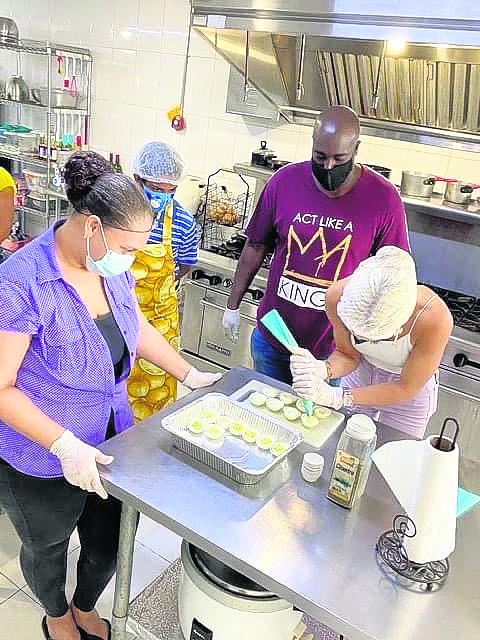“I am so happy with my work as a job coach. The tension to achieve balance between the needs of an employer and the interest of a person with a disability fills me with energy”, is how Lionel Rumnit (55) from Trampolin pa Trabou sees his responsibility.
These days, Rumnit feels that there is a current in the air to recognize that people with disabilities can make a big contribution in the labor market. In any case, the interest is coming from smaller employment agencies, which like Flexo, recognizes an attractive market: that a person with a disability might just be the worker that a company needs, seeing their wish to be as independent as possible. “I receive a lot of requests, there are companies which invite me to come speak to them. A new café will open at Cas di Cultura, and they approached me to see if clients from Trampolin pa Trabou can get a job. All these are very interesting conversations.”
On the other hand, many people believe that Trampolin pa Trabou is also some sort of employment agency, and this belief is also a little bit correct, according to Rumnit. “But on a very small scale. We are a small foundation, with a small administration which cannot manage every detail of personnel. But we manage to put people in jobs through Trampolin. But what we do is protecting our clients.”
Most of their clients receive government assistance, which means they have small income guaranteed, and if they must work more than 20 hours per week, they would receive a salary above 500 Florins, which means they would lose the government assistance. “This way they get the sense that they are contributing, earning something extra, but the 500 is also the level in which they have to start paying taxes. If they remain below it, there’s no problem.” The objective of such an exercise is to improve the quality of life of the person in another way than being home. “The construction through Trampolin is to give this group some sort of security, so that if they don’t succeed in the labor sector, they can always come back.” On the other hand, Rumnit has noticed a development in the sense that the first group was more insecure, and with time, Trampolin’s clients are becoming more confident in themselves to take a job. “Doors are open and most of them are ready for this. And this is particularly after at Trampolin they discovered each of their talents.”
Rumnit’s personal experience
Lionel Rumnit knows what it’s like to live with a person with a disability. His sibling was deaf. But he never thought about working in this area. He attended MTS in Aruba and then started a work cycle at Utrechtse Werkbedrijven, a company that is similar to Trampolin but on a bigger scale. And it was here where Rumnit got his role as a job coach. He is not a social worker, and maybe for this reason, he is not focused solely on making sure to take care of people with disabilities, but on finding the practical way so that both the clients and employer can be happy with each other.
His work can bring happiness many times, but also frustration. The big happiness when Trampolin’s clients manage to get a stable job, but also the great frustration when for one reason or another they cannot find a space.
Rumnit doesn’t blame anyone, because the reality is that it’s not an easy process. Aruba still doesn’t have a system to reward and motivate companies to take in people with disabilities at work. And these arrangements, which do exist in the Netherlands for example, are essential. Rumnit doesn’t see the worth only for his clients to work, he understands also the challenge for the employer, a business owner who needs people who can help the company grow and prosper. In other words, it’s not just about finding a job, but to make sure that both the client is protected and safe, with the warrantees that an employer provides.
On the other hand, the employer must be able to find the motivation, through a law that stimulates it.
Particularly because it takes time to make sure that a person with disabilities can find the right rhythm to function. “I worked in the Netherlands and I saw how many people with disabilities are employed. But in Aruba there is no incentive and no motivation. Many times a person with disabilities gets his financial aid and at the same time the message to not go to work, because they will lose it.” In other words, it is a system that supports itself. And here is where the laws should be change for this group, which is sizeable. Even though there are no numbers available yet from the Census 2020, the numbers from 2010 speak of seven thousand persons with disabilities who rely on financial aid. “If we can achieve that one third of this group gets a job, the government would save about 3 to 4 million florins each year.” In other words, it’s common sense to make laws to give incentives to employers to take in workers with disabilities and make sure that there are safe conditions for everyone.
Rumnit, who has his own family, has managed to balance work and home. He can put the worries from work aside to be present at home, and to be fresh every day to work with people who must be able to trust him. And perhaps the challenges are big, but what motivates Lionel Rumnit is the achievements of people like Lisa Tromp, who even though she is blind, now works as a cook at Sizzlers. Something that for many employers is hard to imagine, but only by giving an opportunity to people who want to show that they want to be self-sufficient despite challenges, the balance can be achieved, something that for Rumnit is so essential.
“These are the experiences that give me a lot of encouragement to continuo with my own work”, Rumnit says.
















